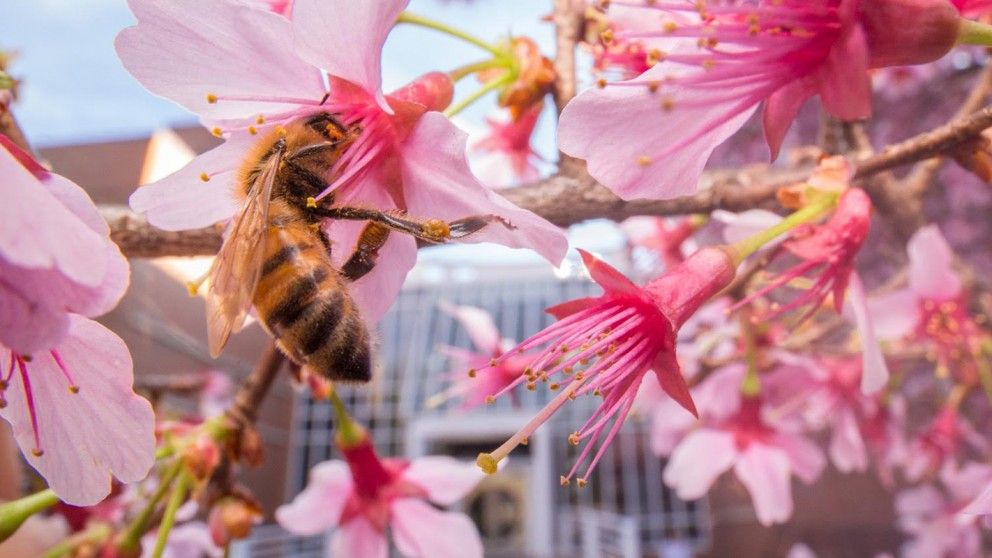
Six years ago, Brooklyn beekeeper Cerise Mayo opened her hive and was startled to see red: Her bees were making honey the color of a cherry.
As it turns out, the critters had found their way into a maraschino cherry factory, where they'd got into a sugary syrup tinted with Red Dye No. 40. The event illustrated how bees, once in the city, may happen upon foods other than ordinary flowers. That in turn can have implications for bee health and the makeup of resulting honey. As urban beekeeping grows in popularity, scientists have increasingly wondered: What do urban bees feed upon?
Researcher Clint Penick and others with North Carolina State University set about to find out, guessing that urban bees would eat more sugar than those found in the countryside. So they were surprised to discover that honeybees in the city and rural areas subsisted almost entirely on flowers, regardless of location.
"There's no evidence that bee colonies were feeding on human food at all," Penick says.
The study was conducted in the town of Raleigh, North Carolina, which is larger than most American cities, and so its conclusions are likely to hold for the majority of the United States. However, it might not be as relevant in more densely populated areas like New York City, which has only 10 percent green space, compared with 50 percent in Raleigh.
In the paper, published May 17 in the Journal of Urban Ecology, the scientists looked at the molecular structure of honey produced by the bees. Honey produced from flowering plants has a specific isotope, or form, of carbon. Honey made from sugary human food, ultimately derived from grasses like sugarcane and corn, however, has a different isotope. Using this distinguishing feature, the researchers were able to confirm that honey produced by rural and urban feral bees came from natural flowering plants and not human-obtained sugars.
The research followed Penick's previous work that found that many ants in New York City had learned to feed entirely upon human food, although some species prefer natural sustenance; Penick wanted to find out if bees acted similarly. (A related study by collaborators at NC State, published December 2014 in the journal Global Change Biology, found that ants within the grassy median of Broadway in Manhattan consume 2,100 pounds of food per year, the equivalent of 60,000 hot dogs.)
The research suggests that parks and plants in cities are even more important than previously thought.
"If you 'build' it, they will come," says bee expert May Berenbaum, with the University of Illinois, who wasn't involved in the study. The findings are a compelling point of argument that can be used by people pressing for more open, plant-filled spaces in cities, as well as proponents of green roofs and urban agriculture, Berenbaum adds. "It's actually very reassuring and reinforces other studies showing the bees are amazingly talented at self-selecting an optimal diet, way more than anyone gave them credit for," she says.
But this applies only if the flowers are there to begin with. In larger, denser cities, bees may not be able to find enough "natural" food and may turn to humans' castoffs, Penick says, as the Brooklyn maraschino cherry bee story illustrates.
So plant some flowers, if you like, or head to the park and marvel as the bees come by, Penick suggests. And just know—they could take a sip of your soda, but they'd rather not, thank you very much.
Uncommon Knowledge
Newsweek is committed to challenging conventional wisdom and finding connections in the search for common ground.
Newsweek is committed to challenging conventional wisdom and finding connections in the search for common ground.
About the writer
Douglas Main is a journalist who lives in New York City and whose writing has appeared in the New York ... Read more
To read how Newsweek uses AI as a newsroom tool, Click here.








